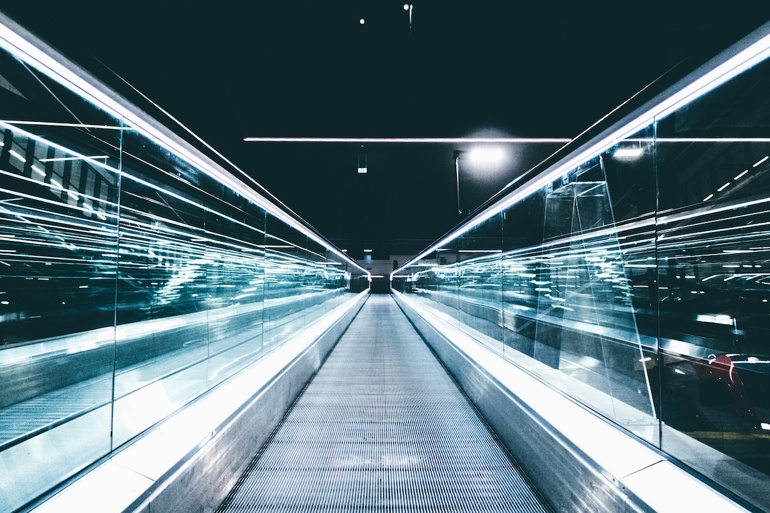


With uncertainty in many areas surrounding resource security and stability, impact on the environment and growing demands for infrastructure, future cities have a lot to consider. Whilst it’s not possible to rebuild large cities from scratch, it’s possible to build smart cities of the future by integrating technology, utilising sustainable power and slowly upgrading existing infrastructure. Leveraging innovations like the Internet of Things (IoT), Artificial Intelligence (AI), and renewable energy sources will help create a more liveable and environmentally-friendly future for all within sustainable smart cities.
We’ll be exploring what smart cities of the future might look like with a greater focus on sustainability, utilising technologies such as IoT and AI, upgraded infrastructure and how these can be integrated.

Dystopian depictions of future cities may be a far cry from cities of today, but smart cities are a real possibility. Here are some of the areas that will shape cities of the future and how Altogether is contributing to a brighter tomorrow.
As cities face issues like water scarcity, carbon footprint and energy shortages are some of the issues that cities are faced with and in redesigning what our cities should look like, sustainability should be at the forefront. The future of urban living will focus on minimising resource wastage and reducing reliance on fossil fuels by adopting renewable energy sources such as solar and wind power. For example, smart grids will allow cities to integrate these renewable energy sources, enabling real-time energy distribution and consumption monitoring.
Additionally, promoting sustainable practices that reward residents for responsible waste disposal, water and power usage and choosing public transport contribute to greater sustainability of the city.
In line with this, projects like Barwon Water’s alternative water grid and the rise of 3D-printed buildings in Melbourne will play a vital role in reducing the ecological footprint of urban living. These initiatives demonstrate how future cities can make use of recycled and treated water, offering solutions to water scarcity while maintaining sustainable urban growth.
In building future cities technology plays a major role. Utilising the Internet of Things (IoT), everything from water meters to streetlights can be connected, preventing resource wastage. AI-powered solutions will further enhance city operations by identifying inefficiencies and optimising systems. Implementing smart grids across the city can integrate renewable energy sources like solar and wind power, optimising energy distribution and enabling real-time consumption monitoring. Smart water management includes the use of smart meters that can detect leaks and give up-to-date data on water usage, allowing for targeted interventions. These technologies will play a crucial role in managing energy consumption and ensuring that cities use resources more efficiently, driving down carbon emissions and supporting a sustainable future.
Rolling out infrastructure on a wider scale takes time and resources, however small steps can be taken to build smart cities. Introducing sustainable systems and renewable energy infrastructure across a city can allow buildings and small communities to generate their own power and to distribute it through vehicle charging systems for instance. Through embedded energy networks, Altogether Group offers the infrastructure to reduce energy consumption, increase energy security, reduce carbon emissions and generate renewable energy. Connecting homes, businesses and communities, embedded energy networks can be rolled out to support future cities in creating a more sustainable infrastructure. In the future, cities will rely more on embedded energy networks that enable buildings and small communities to generate and distribute their own renewable energy. These networks will provide the infrastructure to support electric vehicle charging systems and reduce dependency on centralised energy grids.
Unlike sci-fi depictions, smart cities are not a dream but a potential reality and can be more sustainable, efficient and liveable. By prioritising sustainability, utilising technology and integrating infrastructure, our cities can begin to evolve towards a more sustainable future. Cities will also integrate green infrastructure to combat rising temperatures. This includes planting more trees, creating green roofs, and developing parks that mitigate the effects of urban heat islands. These measures will not only make cities more sustainable but also enhance their livability by promoting biodiversity and improving air quality.
As the world faces increasing water scarcity, recycled water systems will become a crucial element of future cities. Altogether collaborated with University Technology Sydney (UTS) Recycled Water Partnership to supply water to the campus. This initiative provides recycled water for landscaping, toilet flushing, and cooling towers, significantly reducing UTS’s potable water usage by approximately 40,000 kL annually, the equivalent to sixteen Olympic swimming pools.
Cities around the world will need to embrace similar approaches to water management, particularly as climate change intensifies the frequency and severity of droughts. Smart water solutions that integrate with the city’s infrastructure will allow for more efficient use of this precious resource.
If you would like to learn more about how our power and water solutions can contribute to future smart cities or how our utilities can benefit your community, get in touch with us today.
The cities of tomorrow are being built with sustainability at their core. By embracing smart technologies, integrating renewable energy, and upgrading urban infrastructure, we can create cities that are more efficient, resilient, and environmentally friendly. At Altogether, we are committed to contributing to the development of sustainable cities by providing cutting-edge utilities and infrastructure that support both current and future urban needs.
At Altogether, we deliver reliable, localised essential services to over 500 communities across Australia. From world-leading recycled water systems to efficient embedded energy networks in high-rise communities and smart grids in small communities, we're determined to do the right thing by our customers and by the planet. As a multi-utility service provider, it’s our mission to make the world a brighter place and we do that by offering sustainable power, water and data services.
Learn how your community can live more sustainably. Share tips and "waste hacks".
Check us out here.
